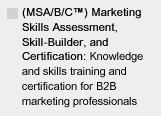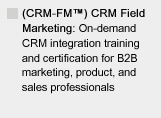MAKE SURE YOU CONTINUE TO RECEIVE EACH ISSUE OF TUESDAY MARKETING NOTES—CLICK HERE TO RENEW YOUR FREE SUBSCRIPTION
Need a Partner? How to Select a New Ad Agency or Marketing Consultant
By Rick Kean, CBC
It's undeniable that we're in the midst of a long-term communications revolution, transforming some of what we do from a discipline based on compelling technical sales messages into a dizzying array of new, non-traditional communications techniques with a whole new set of requirements.
Just keeping pace with evolving technology and new economy marketing strategies takes a lot more than just understanding the unique properties of each communications tool. It requires people who can marshal the right new technology and the right traditional approaches and the right techniques, at the right time. And, to pull them all together into a synergistic whole is a pretty complex chore, one we may not be able to do "in-house."
That's because most of us work in companies that are in the business of reproduction, doing the same things over and over; pump oil, make chips, or punch out steel plate. As marketers, what sets us apart is that in no way are we in the business of reproduction. We are in the business of promoting change, of invention. We don't get paid to repeat ourselves. And one of the reasons that "in-house" agencies don't work is that they become infected with the manufacturing mentality. "Well it worked last time, so let's try it again," With us, the need to innovate is continuous or at least it should be. The process of invention and reinvention never stops. And that job gets even harder when our marketing options ratchet-up.
Who has this expertise on staff? Where does it exist? The potential is there to give your communications more power and more audience involvement than ever before and turn your communications into a measurable competitive advantage in your market. And, make your marketing dollars go farther.
So maybe it's time to consider a partner, a collection of highly-skilled specialists who can make all of this change work for you.
Goodness knows you're faced with an abundance of choices when picking a partner, whether it be an ad or marketing communications agency, or marketing or communications consultant…and none of these choices are easy. What is easy is making a mistake. That mistake, with a little bit of bad luck, can turn into a full-fledged disaster. The numbers certainly don't help. There are theoretically, thousands of firms that could handle your business. The problem is finding the right one for your business.
Here's a checklist that can help shrink the pool of possibilities:
1. First and foremost, look at your needs and your budget. What do you want to accomplish and how much do you have to spend? When you've determined the services that you really need-after eliminating the obvious fluff and ego-building departments you'll probably never use-get a firm grip on your actual promotional dollars (not the funds you hope you'll get, but probably won't ). You should provide a potential partner with complete information about the your company's goals priorities, aspirations and successes, as well as failures and shortcomings. To evaluate a "fit," it's also helpful to do a profile of the company on paper, its markets, competition and strategic objectives.
2. Look at your company through the eyes of your potential partner. With what you have to spend, will your account be significant to the one you select? It's just not in the cards for a small account in a large agency or supplier to expect more than a sliver of time. What a small account receives is a wafer-thin slice of a creative person, a few minutes from a marketing person, a quick hello from the creative director, and a quicker, but firm handshake from the president. No matter what they promise, it may not make dollars and sense.
3. Look carefully at the suppliers whose income/billings would get a significant boost from your business. See how much compatibility really exists between the people you'd be working with on a day-to-day basis and yourself. Supplier companies often use their top people when soliciting new business. Insist on meeting the account and creative people who will be working with you on a regular basis. And, after an initial meeting, seriously analyze the personalities involved and above all, trust your gut reactions. Remember, you met them on their best behavior and they won't get any better as time goes on. Unless you can honestly say, "I can live with these people," look elsewhere.
4. If you decide that a smaller company meets your needs and budget, determine if the company is small because the principals like the intimacy of a smaller group and the chance to work closely with clients? Or, is it small because it's staffed by small people with small ideas and aspirations? Most importantly, are they staffed to be able to handle your needs? A useful guide is to choose a company where you will be one of the top 5 accounts in terms of billings. And, institute a formal evaluation procedure every six months until the relationship is working smoothly and annually thereafter.
5. Analyze their current clients. Is the quality of their business and service comparable to yours? When your company's products are (and are perceived to be) of the highest quality, and their other clients' products are not, do you want to be in their company? Check for conflicts of interest, and accounts that would directly compete with yours. Check their financial stability, credit rating, account turnover rate, personnel turnover rate and the likelihood they'll be in business for at least the next five years. Do they have experience in your type of markets? Has anyone assigned to your account had business experience in your marketplace? Do they know or can they learn your industry's "language?"
6. Once having winnowed the choice to a possible one, pay for a look at the kind of work they do. Ask for and pay for a campaign that will show how they would cope with your marketplace. Don't expect them to provide speculative work. Insist that the campaign be created by the people that will be working on your account. The work they do for others may give a vague feeling of reassurance, but they'll probably never show you the work that failed, only those that worked or at least looked good even though they didn't work. If you think the agency might be right for you, spend a little money and have your assumptions confirmed before making a major commitment.
7. And don't . . . 1: Select a partner as a crutch or a boost to your or your superior's ego. The innovative decor and hip, clever people have nothing to do with the effectiveness of their work, and 2: Don't forget that the buck stops with you. Your partner will perform only as well as you let them. The best thing for anybody's ego is to see the company's sales and profits soar. The right partner can make a real contribution to the cause. The wrong one will prove an incredible financial and emotional drain, benefiting you little, if at all.
As a marketing professional, you should look at every decision analytically, not emotionally. Don't select a partner any differently.
Rick Kean (rkean@businessmarketinginstitute.com) is the Managing Director of the Business Marketing Institute







